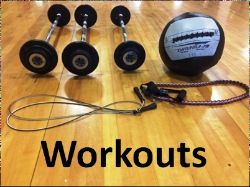Howdy Friends!
How's your Tuesday going so far? As always, things are busy around here and the little bambino is the busiest. She is kicking and punching like crazy. If this is a sign of how active she is going to be once she gets here, E and I better get ready for a wild one! I love feeling all of her little movements. It's such a reassuring reminder that things are going well!
As you guys know, I have been participating in @IdeaFit's #springintoaction photo challenge and today's word is #GOAL. I love setting goals and working towards them. It helps keep me focused and on track; especially when it comes for training for races or tackling bigger projects. I set mini goals every day by making a to do list in the morning and checking things off as I tackle them. I wanted to take a second to go back over how to set SMART goals. I've tackled this in a previous post, but it was a few years ago and with time comes new perspective.
 |
| source |
Specific
Setting a specific goal is crucial. Sure, we all want to "lose weight," but technically you could lose one pound and achieve that goal. Setting specific goals gives you direction, and something more concrete to strive for. Try to make sure all of your goals answer these three questions:
1. What specifically are you going to accomplish? (lose 10 lbs, run a 1/2 marathon in under 2 hours, bench press 150lbs)
2. Why is this important? (lower your blood pressure, reduce your risk of diabetes, place higher in your next race, bench more than your older brother)
3. How are you going to do this? (work out 5 days a week, follow a structured training plan)
Measurable
Having measurable goals means ensuring that you can check in on your progress from time to time.
The largest fallback of unspecific goals is that they are hard to measure. When you can't track a vague goal, you can't see how close you are to sweet success. This eventually leads to frustration, boredom, and, ultimately, failure. As soon as you've set a specific goal, map out some testing points. If your goal is to run a faster 10K, do a trial run every few weeks. If you want to lose 20 pounds in 6 months, record your body weight at regular intervals to track your progress and adjust your plan as necessary. Being measurable is an extension of being specific. If your goal is not specific, how can you possibly know if you're any closer to attaining it?
Achievable
Now we have specific goals that we can measure, but that still doesn't do us any good if we set goals we can't actually reach. For example, I know I will never run a 1/2 marathon in under 1:30, so making that one of my goals is just setting myself up for failure. Creating attainable but still challenging goals will ensure success and ensure you feel successful as well. Setting too tough of a goal will make you feel like a failure, however setting a really easy goal will leave you feeling empty.
Realistic
This kind of goes along with the achievable principle. Sure, I would love to be a runway model, but the fact that I stopped growing at 5 foot 6 inches, and look more like a linebacker than a ballerina means that it's never going to happen. Even if I could somehow look like a supermodel, do I really want to give up almond butter and wedding cake for the rest of my life? NO, I don't! When you are setting goals, ask yourself these three questions:
1. Am I actually capable of achieving this goal?
2. Do I have the necessary skills to do so?
3. Do I really want to do this? (i.e compete in a fitness competition if it means you can never have cake?)
Timely
Another important aspect in goal setting, is mapping out a plan for how you are going to achieve it. For each of my New Years Resolutions, I am going to write out three steps I am going to take to accomplish my goal.
For example, if one of your goals is to lose 10 lbs by May (specific, measurable, achievable, realistic and timely), your 3 steps could be:
1. Attend a cardio class 3 times a week.
2. Strength train on my own 2 times a week.
4. Pack my lunch the night before so I have a healthy lunch to take with me to work.
Now you have laid out exactly how you are going to achieve your goal. I know it might sound silly to think that hard about a New Years Resolution, but why set one at all if you don't put the necessary thought behind it?
There you have it! Now you have a SMART goal. Since I'm growing a little human inside of me, my fitness goals have been paired down a little bit. That doesn't mean I don't have any goals!!
Pregnancy Fitness Goal For Third Trimester:
Workout on my own at least 5x's a week (so not teaching a class), including walking between 3-5 miles 4x's a week and 1-2 strength workouts a week. Since I lift weights and do strength exercises in all of my classes (10-13 classes a week), I want to focus my personal workouts on keeping up my cardiovascular endurance. I would also like to focus on flexibility exercises for at least 10 minutes twice a week outside of my classes. I stretch at the end of every class, but only for about 5 minutes. I know spending more time on stretching is important as my weight starts to shift more and pull things out of wack.
Nutrition Goals For Third Trimester:
One of my big goals for the third trimester is to increase my greens intake. I usually have at least one green salad every day, but I am aiming to incorporate at least 3-5 additional vegetable servings throughout the day. I am going to incorporate at least one if not two green smoothies every day and more green vegetables at dinner and as snacks. So far, I've beeen doing pretty good about getting enough protein, but I definitely plan on keeping track of this during my third trimester as well.
What are your current fitness and nutrition goals?
In health,

share this on » |


oZzMnBSNIqDmkLg~~60_35.jpg)


















you are amazing! perfect goals for the momma to be! keep it up and keep inspiring us.
ReplyDelete